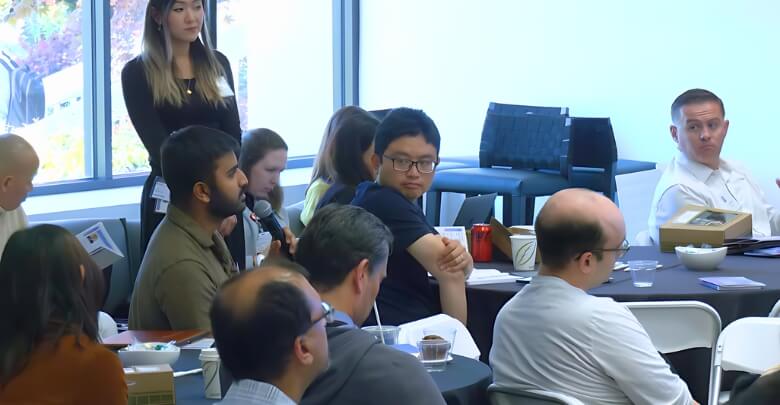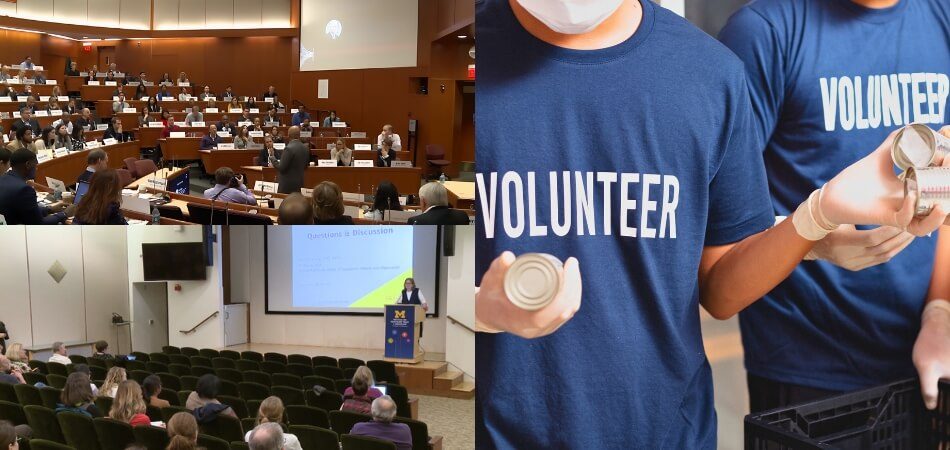Attending a healthcare conference usually involves following certain rules and guidelines, including registering in advance, participating in sessions, and following the event’s code of conduct. But when you want to volunteer at the conference, one question comes to your mind, “Can I volunteer at a healthcare conference?”
Yes, volunteering at healthcare conferences is possible. Contact the conference organizers to express your interest and inquire about available opportunities. They can provide details on how to apply, what roles are needed, and any requirements such as qualifications or time commitments.
The benefits of volunteering include the opportunity to contribute and gain valuable experience. Follow the rest of this article to discover more about the benefits and steps of volunteering at a healthcare conference.
Benefits of Volunteering at a Healthcare Conference
Volunteering at a healthcare conference offers numerous benefits that extend far beyond the event itself. Here’s a closer look at the advantages you can gain from this enriching experience.
Networking Opportunities
One of the most significant benefits of volunteering is the chance to meet and connect with professionals from various fields within healthcare. You’ll interact with speakers, attendees, and fellow volunteers who share your interests. These connections can lead to future job opportunities, collaborations, or mentorships, helping to expand your professional network.
Skill Development
Volunteering allows you to acquire and refine valuable skills. Whether you’re helping with registration, managing sessions, or assisting with logistics, you’ll gain hands-on experience that enhances your resume. Skills such as communication, teamwork, and problem-solving are essential in any career and are especially valuable in the fast-paced healthcare environment.
Industry Insights
By volunteering, you gain firsthand exposure to the latest trends, research, and innovations in healthcare. This insight can deepen your understanding of the industry and inspire your career path. You might also attend informative sessions and workshops, enhancing your knowledge and staying updated on relevant topics. Engaging in an international health care conference can broaden your perspective and introduce you to global practices.
Personal Fulfillment
Volunteering provides a sense of purpose and fulfillment. Contributing your time and efforts to a cause that impacts the healthcare community can be incredibly rewarding. You’ll feel a sense of accomplishment knowing you played a part in the event’s success, which can boost your confidence and motivation.
All in all, volunteering at a healthcare conference is not just about helping others; it’s also about investing in yourself and your future.
Can I Volunteer at A Healthcare Conference?
Volunteering at a healthcare conference can be a rewarding experience, providing you with valuable insights, networking opportunities, and a chance to contribute to the healthcare community. If you’re wondering, “Can I volunteer at a healthcare conference?” the answer is typically yes, as many conferences welcome volunteers from various backgrounds.
Whether you’re a student, a healthcare professional, or simply someone passionate about healthcare, volunteering can enhance your understanding of the industry and open doors to new connections.
Volunteering at a healthcare conference involves a variety of tasks and responsibilities that are essential to ensuring the event runs smoothly and successfully. Each conference may have its own unique requirements, but the following are some common duties you might encounter as a volunteer.
Registration Assistance
One of the primary responsibilities of volunteers is to assist with the registration process. This typically includes:
- Check-in: Welcoming attendees as they arrive and helping them check-in. This often involves verifying their registration details, distributing name badges, and providing them with conference materials like schedules and informational brochures.
- Problem-solving: Addressing any issues that may arise during registration, such as assisting attendees who have forgotten to register or directing them to the right resources for help.
Session Support
Volunteers often play a crucial role in ensuring that workshops, seminars, and panel discussions run smoothly. Key tasks in this area include:
- Room Setup: Arranging seating and ensuring that audiovisual equipment is set up and functioning before sessions begin. This may involve checking microphones, projectors, and presentation slides.
- Assisting Speakers: Helping speakers with their materials, guiding them to their designated rooms, and providing any technical assistance they may need during their presentations.
- Monitoring Attendance: Keeping track of attendance in various sessions and gathering feedback from attendees, which can help organizers improve future events.
Logistical Support
Volunteers contribute significantly to the logistical aspects of the conference. This can include:
- Setting Up: Helping with the physical setup of the conference space before it opens, including arranging tables, chairs, and booths for exhibitors.
- Managing Breaks: Ensuring that refreshment stations are stocked and that food and beverages are replenished during breaks. This is crucial for keeping attendees energized and engaged throughout the event.
- Tearing Down: Assisting with the breakdown of the venue after the conference ends, which can involve packing up materials, dismantling booths, and ensuring the venue is left clean and organized.
Networking Opportunities
As a volunteer, you have the chance to interact with a diverse group of individuals, including:
- Engaging with Attendees: This involves striking up conversations with attendees during breaks, which can lead to meaningful connections and discussions about various healthcare topics. Your willingness to engage can leave a lasting impression and might even lead to mentorship opportunities. Incorporating some engagement tips for health care conferences can also enhance these interactions.
- Connecting with Speakers and Experts: You may have the chance to meet industry leaders and speakers during their sessions or at networking events. Engaging in conversations with them can provide valuable insights into their careers and advice for your professional journey.
Event Promotion and Social Media
Some conferences encourage volunteers to help promote the event on social media or engage with attendees online. Responsibilities can include:
- Live Updates: Sharing live updates on social media platforms during the conference, such as key highlights from sessions, quotes from speakers, and photos of attendees networking.
- Encouraging Engagement: Engaging with attendees on social media by encouraging them to use specific hashtags related to the conference, helping to create a vibrant online community around the event.
Feedback Collection
At the conclusion of the conference, volunteers may be tasked with collecting feedback from attendees to help organizers assess the event’s success. This may include:
- Distributing Surveys: Handing out feedback forms or directing attendees to online surveys where they can share their thoughts on sessions, speakers, and overall conference experience.
- Gathering Insights: Listening to attendees’ experiences and comments can provide valuable qualitative feedback that organizers can use for future improvements.
In summary, volunteering at a healthcare conference is a multifaceted role that encompasses a variety of tasks aimed at supporting the event’s success. From registration to session support and networking, each responsibility offers unique opportunities for personal and professional growth. By taking on these roles, volunteers not only contribute to the conference’s overall experience but also gain invaluable skills and connections that can enhance their careers in the healthcare field.
What Are the Rules for Volunteering at A Healthcare Conference?
You can gain experience and network with professionals by volunteering at a healthcare conference. However, understanding the rules and expectations is crucial for a successful experience. Here are some key guidelines to keep in mind.
Application Process
Start by identifying the conference you want to volunteer at. Visit the conference organizer’s website to find volunteer application details. Fill out the application form with accurate and honest information. Submit your application before the deadline to be considered.
Qualifications and Skills
Different roles require different qualifications and skills. Some positions might need a healthcare background or specific technical abilities. Ensure you meet the qualifications for the role you’re interested in. This helps you contribute effectively and benefit from the experience.
Time Commitment
Volunteering at a conference requires a significant time commitment. Understand the schedule and make sure you can attend all required sessions. Being punctual and reliable is crucial for all volunteer roles. Plan your availability accordingly to avoid any conflicts.
Professional Behavior
Maintain a professional demeanor at all times during the conference. Dress appropriately according to the conference guidelines. Be courteous and respectful to all attendees, speakers, and fellow volunteers. Your behavior reflects on the conference and your reputation.
Duties and Responsibilities
Be aware of the specific duties and responsibilities of your volunteer role. Follow instructions given by conference organizers or supervisors. Be proactive in assisting with tasks and addressing any issues that arise. Completing your assigned tasks efficiently is essential.
Communication
Effective communication is vital when volunteering. Stay in contact with the conference organizers for updates and instructions. Use appropriate channels for any questions or concerns. Clear communication ensures smooth operations and improves your volunteer experience.
Safety and Emergency Procedures
Familiarize yourself with the conference venue’s safety and emergency procedures. Know the locations of emergency exits and first aid stations. Follow all safety protocols and guidelines provided by the organizers. Your safety and that of attendees is a top priority.
How to Apply for Volunteering at A Healthcare Conference?
Volunteering at a healthcare conference begins with contacting the conference organizers directly. Information about available roles, application procedures, and prerequisites can be obtained from them. Additionally, some conferences may even allow volunteers to bring a guest to a health care conference, enhancing the experience further. Volunteering offers valuable experience in the healthcare field and event management.
Step 1: Research Conferences
Begin by researching upcoming healthcare conferences that align with your interests. Look for conferences that have volunteer programs and opportunities. Check their official websites for detailed information.
Step 2: Visit the Conference Website
Go to the official website of the conference organizer you are interested in. Navigate to the volunteering section to find relevant information. This section usually outlines available roles and application processes.
Step 3: Check Eligibility Requirements
Review the eligibility requirements for volunteering. Some roles may require specific skills or qualifications. Ensure you meet these criteria before applying to avoid any issues later.
Step 4: Prepare Your Application
Gather necessary documents like your resume and any certifications. Prepare a cover letter explaining your interest in volunteering. Highlight relevant skills and experiences that make you a suitable candidate.
Step 5 Fill out The Application Form
Locate the application form on the conference website. Fill out the form accurately and thoroughly. Provide all requested information, including personal details, experience, and availability.
Step 6: Submit Your Application
After completing the application form, submit it through the specified method. This could be via an online form, email, or postal mail. Double-check for any additional required documents before submission.
Step 7: Follow Up
After submitting your application, follow up with the organizers. Send a polite email to confirm receipt of your application. This demonstrates your enthusiasm and ensures your application is considered.
Frequently Asked Questions
Gaining experience and networking with professionals in the healthcare field can be gained by volunteering at a healthcare conference. Here are some frequently asked questions and their answers to help you get started.
How Do I Find Volunteer Opportunities at Healthcare Conferences?
Begin by researching healthcare conferences online and visiting their official websites. Check the volunteering section for available roles and application details. Contact the organizers directly to express your interest and inquire further.
Are There Any Qualifications Required to Volunteer?
Some roles may require specific qualifications or experience in the healthcare field. Review the eligibility criteria before applying to ensure you meet the requirements. This helps you contribute effectively to the conference.
How Much Time Do I Need to Commit as A Volunteer?
Time commitments vary depending on the role and conference schedule. Be prepared to dedicate several hours or more each day. Ensure you can attend all required sessions to fulfill your volunteer duties.
Can Students Volunteer at Healthcare Conferences?
Yes, many conferences welcome student volunteers, especially those studying healthcare-related fields. Volunteering offers students a chance to gain practical experience and network with professionals. Ensure you meet any specific requirements for student volunteers.
What Should I Include in My Volunteer Application?
Include your resume, a cover letter explaining your interest, and any relevant certifications. Highlight your skills and experiences that make you a suitable candidate. Be honest and thorough in providing all requested information.
Bottom Line
Volunteering at a healthcare conference offers a unique chance to contribute and gain valuable experience. By understanding the application process and meeting the necessary qualifications, you can effectively secure a volunteer role. It’s essential to adhere to the rules and expectations to ensure a smooth and successful experience.
Maximizing your experience involves being proactive, communicating effectively, and understanding your duties. The benefits of volunteering include networking opportunities. For those asking, “Can I volunteer at a healthcare conference?” the answer is yes, with the right preparation and commitment.
The numerous benefits of volunteering can be enjoyed by following the steps outlined and preparing thoroughly. This includes hands-on experience, networking, and contributing to the success of the event. Embrace the opportunity to learn, grow, and make meaningful connections in the healthcare industry.








